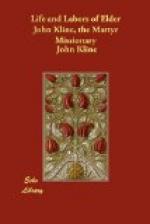Some one has said of this letter to the Ephesians that it is the whole Gospel in a nutshell. This may be true; but I must confess for myself that in some parts the shell is so very hard, that in my efforts to crack it the broken fragments, under the hammer of investigation, fly out of sight, with the kernel still sticking in them. It may be that Peter had some of these hard shells in mind when he said: “Our beloved brother Paul hath written many things hard to be understood; which they that are unlearned and unstable wrest, as they also do the other scriptures, unto their own destruction.” The Lord forbid that I should thus do with any of the Scriptures.
I am delighted to say, in full view of all this, that there is not much danger of the honest seeker for truth being misled by anything Brother Paul has left on record. If there is any danger at all of this kind, I think it is to be found in giving what he says on election and predestination a wrong interpretation. I have been frequently asked how I interpret his strikingly bold utterances on this subject, and how I reconcile them with my belief in the absolute freedom of the human will.
In the first place, I unhesitatingly profess my belief in the absolute freedom of man’s will. How else could man comply with the injunction given in the text: “Walk in love?” If he has no will of his own, why give him a command? This freedom of man’s will is a logical necessity. Reason demands it. Now, let us look at this a little. If man is not free to choose between good and evil; between right and wrong; between truth and falsity; wherein lies the reasonableness of instructing him? of exhorting him to do what is right, and to shun what is wrong? of commanding him to do good, with promises of reward for his obedience, and threatenings of judgment and fiery indignation as the sure penalties of his disobedience and sin?
Some admit the freedom of man’s will to do evil, but not to do good. But do you not see that if this be true man’s will is only half free—free to act in one direction, but not in another? On this assumption, where is the reasonableness of giving him admonitions, invitations and entreaties to do good, when he has not the power within him to comply?
You may answer by quoting the Lord’s words: “Without me ye can do nothing.” I fully believe these words of our Lord. But if you apply them specifically to the will, they prove that men can do neither good nor evil without the Lord. This you may not admit; but I believe it is just what our Lord meant. All life is from him as God. All beings, the evil as well as the good, “live and move in him.” I believe that our Lord is, every hour and every moment of every man’s life, seeking to turn the heart, the WILL of the man from evil to good, from darkness to light, and from the power of Satan to himself. “He causeth his sun to rise on the evil and the good; and sendeth his rain on the just and on the unjust.”




